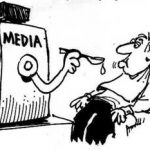 Fake news has been one of the foremost trends of the past year, with growing concerns about the reliability of information with which people are basing crucial decisions. I’ve written previously about the EU Debunker project, which recently highlighted the crucial role journalists can play in debunking fake news, but there is also a key role for us, the reader to play too.
Fake news has been one of the foremost trends of the past year, with growing concerns about the reliability of information with which people are basing crucial decisions. I’ve written previously about the EU Debunker project, which recently highlighted the crucial role journalists can play in debunking fake news, but there is also a key role for us, the reader to play too.
A recent study from the University of Illinois highlights how greater awareness of the media among the general public can go a long way towards ensuring they have a more balanced perspective on the stories they read.
The power of media literacy
The researchers quizzed several hundred participants to gauge their media literacy levels. This included not only their knowledge of the news media but also various psychological traits that are associated with how we process news messages. They then compared that with tests to see how those participants reacted to various conspiracy theories.
There seemed to be a direct correlation, with people who had a poor understanding of how the media works generally having higher beliefs in conspiracy theories.
“The greater one’s knowledge about the news media – from the kinds of news covered, to the commercial context in which news is produced, to the effects on public opinion news can have – the less likely one will fall prey to conspiracy theories,” they say.
Overcoming biases
The findings are certainly intuitive, but where they are perhaps most interesting is that it was found to apply even when the conspiracy theory chimed with the political beliefs of the participant. In other words, greater media literacy dampened the biases with which we view much of the news via.
For instance, participants who identified themselves as liberals were less likely to believe liberal conspiracy theories when they had good media literacy (and vice versa for conservative participants).
The study is interesting because they don’t classify conspiracy theories purely at the wilder end of the spectrum, but also include misinformation that is more widely believed, whether that vaccines cause autism or that climate change is a hoax.
“Conspiracy theories are almost by definition ‘good’ (i.e., enticing) stories,” the authors say. “The power of a compelling narrative and one’s pre-existing biases are often no match for conflicting information.”
The authors are at pains to point out that greater media literacy isn’t a silver bullet in its own right, but it does offer the potential to improve matters with relatively little effort. It also has a better chance of success because it doesn’t involve explicitly changing set beliefs. If greater education literacy can be promoted from a young age however, it could have a big impact.
“One of the tricky areas for people in the news literacy area is you want to encourage skepticism, you want to encourage people to be actively thinking about news, not just consuming it like candy,” the authors say. “But there’s kind of a fine line between being a skeptical news consumer and a cynical one, where the cynical one would just think, ‘Oh well, they all make stuff up, they all do it, it’s all wrong.’ That doesn’t serve anyone, either.”